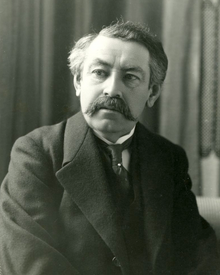Aristide Briand | |
|---|---|
 Briand c. 1920s | |
| Prime Minister of France | |
| In office 29 July 1929 – 22 October 1929 | |
| President | Gaston Doumergue |
| Preceded by | Raymond Poincaré |
| Succeeded by | André Tardieu |
| In office 28 November 1925 – 17 July 1926 | |
| President | Gaston Doumergue |
| Preceded by | Paul Painlevé |
| Succeeded by | Édouard Herriot |
| In office 16 January 1921 – 12 January 1922 | |
| President | Alexandre Millerand |
| Preceded by | Georges Leygues |
| Succeeded by | Raymond Poincaré |
| In office 29 October 1915 – 17 March 1917 | |
| President | Raymond Poincaré |
| Preceded by | René Viviani |
| Succeeded by | Alexandre Ribot |
| In office 21 January 1913 – 18 March 1913 | |
| President | Armand Fallières |
| Preceded by | Raymond Poincaré |
| Succeeded by | Louis Barthou |
| In office 24 July 1909 – 27 February 1911 | |
| President | Armand Fallières |
| Preceded by | Georges Clemenceau |
| Succeeded by | Ernest Monis |
| Minister of Foreign Affairs | |
| In office 23 July 1926 – 12 January 1932 | |
| Prime Minister | Raymond Poincaré André Tardieu Camille Chautemps Théodore Steeg Pierre Laval |
| Preceded by | Édouard Herriot |
| Succeeded by | Pierre Laval |
| Minister of Justice | |
| In office 24 August 1914 – 29 October 1915 | |
| Prime Minister | René Viviani |
| Preceded by | Jean-Baptiste Bienvenu-Martin |
| Succeeded by | René Viviani |
| In office 14 January 1912 – 21 January 1913 | |
| Prime Minister | Raymond Poincaré |
| Preceded by | Jean Cruppi |
| Succeeded by | Louis Barthou |
| In office 4 July 1908 – 24 July 1908 | |
| Prime Minister | Georges Clemenceau |
| Preceded by | Edmond Guyot-Dessaigne |
| Succeeded by | Louis Barthou |
| Member of the Chamber of Deputies | |
| In office 27 April 1902 – 7 March 1932 | |
| Constituency | Loire (1902–09) Loire-Inférieure (1909–32) |
| Personal details | |
| Born | Aristide Pierre Henri Briand 28 March 1862 Nantes, Loire-Atlantique, France |
| Died | 7 March 1932 (aged 69) Paris, France |
| Political party | French Socialist Party (1902–1904) Independent Socialists (1904–1911) Republican-Socialist Party (1911–1932) |
| Education | University of Paris |
Aristide Pierre Henri Briand (French: [aʁistid pjɛʁ ɑ̃ʁi bʁijɑ̃]; 28 March 1862 – 7 March 1932) was a French statesman who served eleven terms as Prime Minister of France during the French Third Republic. He is mainly remembered for his focus on international issues and reconciliation politics during the interwar period (1918–1939).
In 1926, he received the Nobel Peace Prize along with German Foreign Minister Gustav Stresemann for the realization of the Locarno Treaties, which aimed at reconciliation between France and Germany after the First World War.[1][2] To avoid another worldwide conflict, he was instrumental in the agreement known as the Kellogg–Briand Pact of 1928, as well to establish a "European Union" in 1929.[3] However, all his efforts were compromised by the rise of nationalistic and revanchist ideas like Nazism and fascism following the Great Depression.
- ^ Lundestad, Geir (15 March 2001). "The Nobel Peace Prize, 1901–2000". Nobel Foundation. Retrieved 6 October 2011.
- ^ "The Nobel Peace Prize 1926". Nobel Foundation. Retrieved 6 October 2011.
- ^ Leboutte, René (2008). Histoire économique et sociale de la construction européenne (in French). Peter Lang. p. 33.